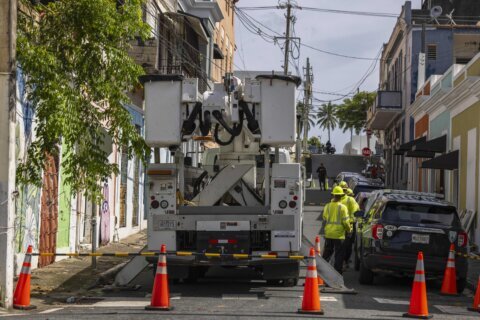NEW DELHI — On a recent evening, Charu Chaudhary, a teacher in New Delhi, was up until 11 p.m. with a tailor at her house, planning outfits for her daughter’s wedding. Four ceremonies will be spread over four evenings, including live music and dinners, three of them indoors.
The guest list is restricted to 200 people, and all waiters will be wearing personal protective equipment and face shields, Chaudhary says. Guests will be required to wear a mask, but for photos “it can be removed.”
The wedding date was set a year ago by a priest, based on the auspicious alignment of stars, and Chaudhary isn’t keen to change it even though COVID-19 infections in India’s capital hit a new record high recently.
Chaudhary, however, sounds a casual chord when discussing the risks of infection from the pandemic. “What are you going to do by being scared?’ says the 48-year-old. “If it has to happen, it can happen if I stay at home also.” That sums up an attitude that’s prevalent among many in India, who are resuming normalcy, planning family gatherings and visiting crowded bazaars, even as the COVID-19 pandemic rages on.
India reported 38,000 new infections on a recent day. It has the second-highest number of cases in the world, after the United States, at more than 8.6million, according to data from Johns Hopkins University. The average of new daily cases in India has halved from the more than 90,000 cases at one point in September, but medical experts have been hard pressed to explain what’s behind the decline. Many expect it to surge again as people venture out for shopping and family gatherings for festivals, including the Hindu festival of Diwali on Nov. 14.
“The number of patients, number of cases will shoot up now,” says K Vijay Kumar, a doctor at Citizens Specialty Hospital in the south Indian state of Hyderabad. “People have gained more confidence that ‘even if I get corona, I will get out of it.'”
[MORE: People in India Struggle to Maintain Social Distancing]
In Europe, a surge in cases in recent days has led to fresh lockdowns in the United Kingdom, Portugal and Italy. India’s government, on the other hand, is phasing out strict lockdowns. It is allowing larger gatherings of people and reopening public transport, cinema halls and gyms as it seeks to recoup economic losses incurred during the nationwide lockdown that was imposed starting in late March. The two-month lockdown was said to be one of the world’s strictest, and it rendered millions of people jobless and without money to buy food. India’s economic output contracted by around 24% in the April-to-June quarter, the worst contraction among G-20 countries. The U.S. economy, in comparison, contracted 9% during the same period.
The Indian economy has reopened in phases since June. Since early November, Delhi has allowed public buses to run at full capacity, up from half capacity, and raised the number of attendees allowed at weddings from 50 to 200. Some states have reopened schools. The state of Goa has reopened casinos with 50% capacity.
Virus or no virus, traders and small business owners say they cannot afford another lockdown.
“The position now is do or die,” says Rakesh Kumar Yadav, who heads an association of shopkeepers in Sadar Bazaar, a market in Delhi. “If this lockdown is imposed again, we’ll not be able to feed our employees.”
Recent pictures of Sadar Bazaar showed the market to be packed with shoppers, who go there to buy everything from imitation jewelry, to utensils, toys, clothes, and wedding invitation cards. Yadav says that Sadar Bazaar has about 40,000 shops, squeezed together in an area that is roughly one-third the size of Central Park in New York. These shopkeepers get their biggest sales during the festival season, Yadav says.
Unlike developed countries, India has not supported businesses and consumers with cash credits during the pandemic.
“The whole bit of livelihood is pushing people to take the risk, and come out and take up a job,” says Rajneesh Singh, Delhi-based managing director of SimplyHR, an employment services firm. Singh is referring to people who work for daily wages, such as construction workers — laborers who make up a large portion of India’s workforce. Around 90% of India’s workforce is informal.
[STUDY: Informal Female Workers Face Harassment and Abuse in India]
The economic necessity of physically returning to work, compounded by a more relaxed approach of some people toward the virus, has led to a surge in cases in a few areas in the country, namely Delhi, and the states of Maharashtra, Kerala and West Bengal.
Delhi recently reported 7,745 new cases in a period of 24 hours, its highest ever, and chief minister Arvind Kejriwal has called it a “third wave” of infections.
Chaudhary, the mother of the bride, says the fear of catching the virus may keep some of her invitees from coming to the wedding. But the “young generation is going to turn up.”
Chaudhary and her family had arranged her daughter Vani’s wedding to a Delhi-based man more than a year ago. They had wanted to wait for the wedding until Vani, 24 years old, finished college this year.
After the pandemic struck, Chaudhary says they considered reducing the number of ceremonies. “We had already paid the booking amount” for various venues last December, and they didn’t want to lose that. She says they have taken many safety measures for the wedding functions, including sanitization of the venues. Guests won’t be allowed to serve themselves to avoid many people using the same serving spoon, she says, adding that only PPE-wearing waiters can serve food.
In recent days, as Choudhary went to popular Delhi markets for wedding shopping, she says she always wore masks and gloves. But social distancing wasn’t possible, given the crowds. “Markets are full as if people are getting things free of cost.”
More from U.S. News
Informal Female Workers Face Harassment and Abuse in India, Report Finds
The Most Religious Countries, Ranked by Perception
The 25 Best Countries in the World
Across India, a Balance to Reclaim Normal Lives Amid Coronavirus Pandemic originally appeared on usnews.com







